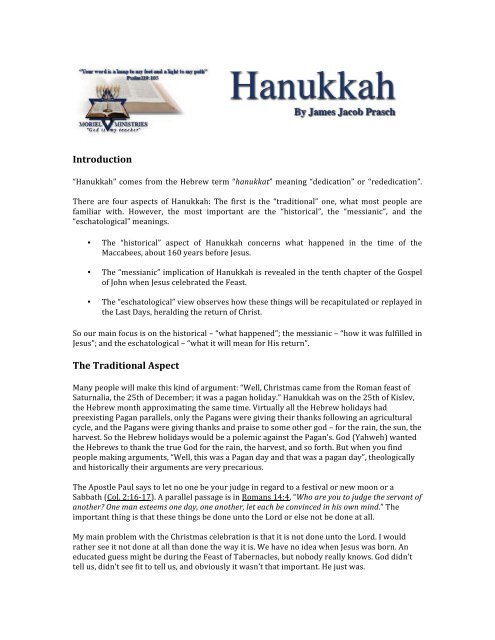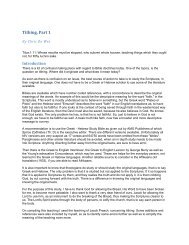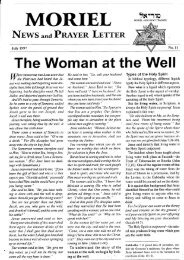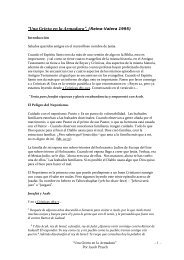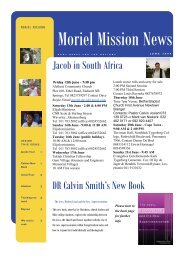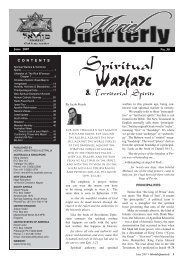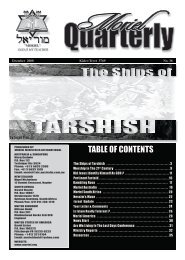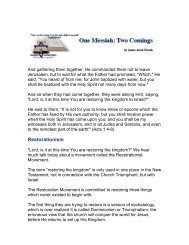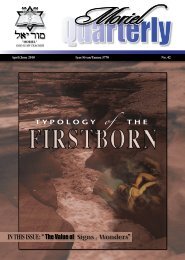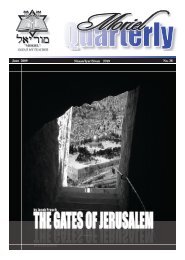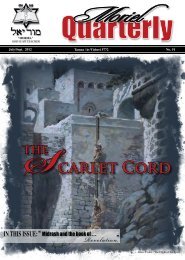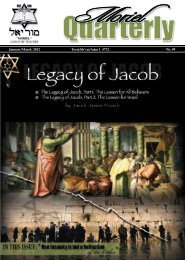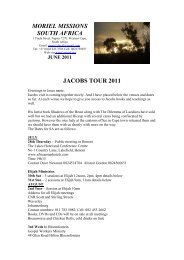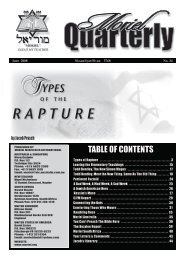Introduction The Traditional Aspect - Moriel Ministries
Introduction The Traditional Aspect - Moriel Ministries
Introduction The Traditional Aspect - Moriel Ministries
You also want an ePaper? Increase the reach of your titles
YUMPU automatically turns print PDFs into web optimized ePapers that Google loves.
<strong>Introduction</strong> “Hanukkah” comes from the Hebrew term “hanukkat” meaning “dedication” or “rededication”. <strong>The</strong>re are four aspects of Hanukkah: <strong>The</strong> first is the “traditional” one, what most people are familiar with. However, the most important are the “historical”, the “messianic”, and the “eschatological” meanings. • <strong>The</strong> “historical” aspect of Hanukkah concerns what happened in the time of the Maccabees, about 160 years before Jesus. • <strong>The</strong> “messianic” implication of Hanukkah is revealed in the tenth chapter of the Gospel of John when Jesus celebrated the Feast. • <strong>The</strong> “eschatological” view observes how these things will be recapitulated or replayed in the Last Days, heralding the return of Christ. So our main focus is on the historical – “what happened”; the messianic – “how it was fulfilled in Jesus”; and the eschatological – “what it will mean for His return”. <strong>The</strong> <strong>Traditional</strong> <strong>Aspect</strong> Many people will make this kind of argument: “Well, Christmas came from the Roman feast of Saturnalia, the 25th of December; it was a pagan holiday.” Hanukkah was on the 25th of Kislev, the Hebrew month approximating the same time. Virtually all the Hebrew holidays had preexisting Pagan parallels, only the Pagans were giving their thanks following an agricultural cycle, and the Pagans were giving thanks and praise to some other god – for the rain, the sun, the harvest. So the Hebrew holidays would be a polemic against the Pagan’s. God (Yahweh) wanted the Hebrews to thank the true God for the rain, the harvest, and so forth. But when you find people making arguments, “Well, this was a Pagan day and that was a pagan day”, theologically and historically their arguments are very precarious. <strong>The</strong> Apostle Paul says to let no one be your judge in regard to a festival or new moon or a Sabbath (Col. 2:16-‐17). A parallel passage is in Romans 14:4, “Who are you to judge the servant of another? One man esteems one day, one another, let each be convinced in his own mind.” <strong>The</strong> important thing is that these things be done unto the Lord or else not be done at all. My main problem with the Christmas celebration is that it is not done unto the Lord. I would rather see it not done at all than done the way it is. We have no idea when Jesus was born. An educated guess might be during the Feast of Tabernacles, but nobody really knows. God didn’t tell us, didn’t see fit to tell us, and obviously it wasn’t that important. He just was.
However, Hanukkah is something different. <strong>The</strong>re is both an historical and a biblical – that is, a New Testament – precedent, for the Feast of Hanukkah. However, most of what we associate with Hanukkah now in Jewish culture – in “Yiddish kiten” – and most of what many Christians who know about it (if they do know about it) comes from something that’s traditional. Most of the traditions associated with Hanukkah originated not in the ancient world, but in the Middle Ages; even the words of the songs associated with the Feast. <strong>The</strong> most famous song, “Ma’oz tzur y’shuati” derives from the Hebrew of the Middle Ages, not biblical Hebrew or modern Hebrew. Hanukkah tradition says that the oil burned for eight days. <strong>The</strong>re was enough oil in the lamp in the menorah in the temple for only one day, but it burned for eight. Again, there is no historical record of that in the book of 1 Macabees or 2 Macabees, and certainly nothing in Scripture; it was developed later. That is not to say it is not true. It may have happened, but it is never recorded in history. It was not mentioned by Josephus in Antiquities in a big way. People wonder how Josephus knew about it, but in his Antiquities much of what is focused on today was not his emphasis. Hanukkah is the Jewish Feast of Light and the Jewish Feast of Miracles. <strong>The</strong> miracle was seen not in that the lamp burned eight days, but in that God gave them this incredible victory over this all-‐powerful enemy. And the light, of course, was when they rededicated the temple and they were able to light the menorah in the temple. We know from Psalm 119:105: <strong>The</strong>y Word is a lamp unto my feet And a light unto my path So the menorah burning in the temple represented the Word of God to the Hebrews. But the windows of the temple were unique. Normally, windows were built wide on the outside and then going narrow into the inside in order to focus light inside the building. But the shape of the temple where the menorah stood would be wide on the outside and then, to capture as much light as possible from the menorah, focused narrowly so it would shine out over what we call the “Millo” and go from the temple mount onto the City of David below. Hence the idea built into the architecture of the temple was that the light of Yahweh – the light of His Word – would come from the temple. <strong>The</strong> architecture of the temple illustrated that the Law would go forth from Zion and it would shine out. And so when the temple was rededicated this was the idea, that now we could re-‐illuminate the menorah. Today you have things like traditional Hanukkah food. People eat jelly donuts called “sufganiot“. I don’t think they did that in ancient times. <strong>The</strong>y ate “latkas”, potato pancakes, special kinds of knishes, if you like Jewish food. And then, of course, there’s the “dreidel”: a Yiddish word based on the Hebrew word ” tsvivon”, “to spin” and there’s an acronym on it, “Nes, Gadol, Hya, Po” {A Great Miracle happened here.) <strong>The</strong>y would spin the dreidel and children play the game with the dreidel, the top. What is popularly associated with Hanukkah has little to do with what actually transpired historically, and has little theological significance outside that which the rabbis attributed to it later on. So there is the historical Hanukkah and the traditional. Another way to look at this is to compare the nativity, as recorded in Luke and Matthew, with the tradition of the church. It’s not just an
embellishment; a lot of it is just made up. Tradition says there were three wise men yet you don’t find that in the New Testament. <strong>The</strong>se stories are just made up. So it is with Hanukkah. <strong>The</strong> Historical <strong>Aspect</strong> Daniel is the only book of the Bible containing all three original languages: Aramaic (or Chaldee), Hebrew, and Greek. It has Greek words for certain things like musical instruments and so forth that would have been brought there by Macedonian mercenaries most likely. <strong>The</strong> portions of Daniel that focus on the prophetic purposes of God specifically for the Jews are in Hebrew. <strong>The</strong> portions of Daniel focused on the prophetic purposes of God for Israel, relative to the nations, are in the lingua franca of the time, which was Chaldee (Aramaic). <strong>The</strong> Rise and Fall of Assyria When you read the book of Daniel, remember that the Last Days are like Daniel’s days. <strong>The</strong> Jews were terrified of Assyria. <strong>The</strong>y were the bad guys, the ones that took the ten northern tribes into captivity. <strong>The</strong>se were the cruelest and most powerful Pagans. Nobody imagined that Assyria would one day implode. Once it did, there was a false sense of peace that lasted a very short time. <strong>The</strong>y were confronting Babylon and its meteoric rise, which was far worse than Assyria. And it had ancient roots (certainly spiritually) going back to the Tower of Babel. <strong>The</strong> Rise and Fall of Media-‐Persia Babylon went down the tubes overnight. And as Daniel prophesied, Media-‐Persia rose in its place. <strong>The</strong> Persians aligned with the Medes all the way until the late 20th Century during the rule of the Shah of Iran. Going back to Isaiah’s prophecies, the Persians (the Iranians) always favored the Jews even though it was an Islamic country, all the way until the fall of the Shah in the 1970’s. He claimed to be a descendant of the Peacock Throne of Cyrus the Great (“Kowresh”), who was prophesied about twice by Isaiah. (Is. 44:28; 45:1) And all the way until that time the Iranians favored the Jews. <strong>The</strong>ir culture and languages were not Arabic, nor was the culture. <strong>The</strong>y were “Zoroastrian,” monotheists who traced their monotheism in part back to Zoroastor, but were influenced by the Jews. <strong>The</strong> Magi were Media chaplains to the kings of Media-‐Persia. That was the origin of the Magi. And because of the monotheistic influences they had from Zoroastor and from the Jews in the captivity (who influenced Nebuchadnezzar), they journeyed to see Jesus. You always had this link with the Persians and the Jews that lasts until the Last Days. <strong>The</strong> Socratic Greeks in the West had the most light about monotheism, but in the East it was the Zoroastrians who had the most light about monotheism <strong>The</strong> Socratic Greeks were in the West much later, but the Persians – Zoroastrian Persians – had the most light. <strong>The</strong> Rise and Fall of Greece But the Persian Empire did not last long due to the conqueror Alexander the Great. But then Alexander the Great did not last long. He reached the desert of Belushistan, conquered most of the known world, and then at the age of 36 he got sick and died. His empire fragmented and was divided between four of his generals. <strong>The</strong> two most important of these were Seleucus, who got Syria, Lebanon, Galilee, and central Israel – and Ptolemais, who got Egypt and southern Israel. <strong>The</strong>y are the two most important of the four, historically, but also in the Bible.
<strong>The</strong> Seleucids were Syro-‐Phoenician Greeks, Greeks who lived in that area of Phoenicia – of Lebanon and around Alippo in Syria – down to the area of Tyre and Sidon. Luke the apostle was a Syro-‐Phoenician who converted to Judaism. Antiochus Epiphanes is one of the most important types – or foreshadows – of the Antichrist in the Bible. He came from the line of Seleucids called the dynasty of Antiochus. <strong>The</strong>re were Antiochus I, II, III, and IV. Antiochus IV is Antiochus Epiphanes. <strong>The</strong> Greek speaking Jews would ridicule him by changing it to “Epimanus”, meaning “the mad one.” You had this historical situation with the kings of the north and the kings of the south. Assyria goes, then it’s Babylon. Babylon goes, then it’s Media-‐Persia. Persia goes, then it’s the Greeks. <strong>The</strong>n there’s a worldwide chaos among the known world, and out of the chaos Rome comes to power. And in the middle of all this, Jews are going back to their land. In the Last Days, the same thing happens. Similarities to Today Growing up in the Baby Boomer generation, the big threat was “the Soviets”. <strong>The</strong>y were the ones persecuting Christians; they did not believe in God; they were dogmatically atheistic. Nobody of our generation who remembers the Cuban Missile Crisis and Vietnam would have thought the Soviet Union would have imploded and the Berlin Wall would have come down. It imploded – just like Assyria, bringing a false sense of peace to the world, until you turn around and you’re looking at a much more dangerous enemy, Islam. When I was a little boy in New York during the Cuban Missile Crisis, I remember Nikita Kruschev came to New York and literally took off his shoe and pounded it on the podium in the U.N. saying, “We will bury you! We will bury you!” He actually did that. In a matter of months, Brezhnev, Suzlov, and the Politburo deposed him. You can’t have a mad man that likes to drink vodka with his finger on the button. During the Watergate crisis, Nixon was stoned on tranquilizers and alcohol according to his associates Colson, Haig, and Kissinger. And he called a stage three nuclear alert on the Soviets during the Yom Kippur War, trying to capitalize on the war, to save his own neck politically. He was deposed within a matter of weeks. <strong>The</strong> American establishment turned against him. You can’t have a nut stoned on tranquilizers and alcohol with his finger on the button. <strong>The</strong> Islamic world does not think that way. <strong>The</strong> Hindu world does not think that way. <strong>The</strong> Hindu believes he’s going to be reincarnated, and the Muslim thinks he’s going to be “Shahadi”. <strong>The</strong> only assurance of salvation in Islam is to die in a Jihad. Hence, just like the world was in a much more precarious state after Assyria collapsed, the same is true now. It is in a much more dangerous and precarious state now when Islamic countries are getting enough fissionable materials to make even a 50-‐megaton bomb. So it is a very rapid series of world empires rising and falling very quickly and, in the middle of all this, the Jews come back to their land – just like what happened in the book of Daniel. To understand the Last Days, we have to understand what happened here. Now notice something else when you see the kings of the North and the kings of the South. <strong>The</strong> final conflict could not be East-‐West; it had to be North-‐South. It had to be a North-‐South conflict just like in the days of Daniel. And that’s what you’re going to see. You’re going to see a North-‐
South conflict, creating the same kind of chaos that existed in the days that saw the rise of the Roman Empire. That will happen again out of the chaos. Pompeii as a Type of Antichrist Notice that the figure earlier in the 11th chapter of Daniel also enters the “ Beautiful Land” in verse 16, and he also makes a false covenant. One of the problems you’re going to have in the Last Days is that there are many Antichrists. So every time somebody tries to sign a peace treaty in the Middle East, people are going to say, “That’s it!” This ultimate Antichrist is going to be different. He will be in the character – insofar as this text is telling us – of two people. One is Antiochus IV – Epiphanes, and the other is General Pompeii. Whenever somebody other than the High Priest on the Day of Atonement (or than Lord Jesus Himself in the book of Hebrews) enters the Holy of Holies, it’s a type of the Antichrist. And the Roman General Pompeii did that. He represented the triumvirate of Rome, made a treaty with the Jews, and then the Jews were double-‐crossed and he entered the Holy of Holies. He is a major, major type of the Antichrist which people overlook. Antiochus IV as a Type of Antichrist <strong>The</strong> Hasmonean Period was between the time of Macabees and Pompey. <strong>The</strong> Hasmoneans were the descendants of the Macabees. It was a prosperous period where they thought the throne of David was going to be resurrected, and it was where the messianic expectation was really amplified. Much of the stage was set for the coming of Jesus in the Hasmonean Period. <strong>The</strong> Hasmoneans began right, but ended bad. Antiochus IV had an agenda to use culture and religion to gain political control. <strong>The</strong> Antichrist will do the same thing. He will try to make something multi-‐cultural and multi-‐faith, and he will come in the character of Antiochus. Now remember, other people were doing similar stuff before Antiochus came. <strong>The</strong> important thing to remember is that up to verse 36 of Daniel 11, there was a partial historical fulfillment. Antiochus did everything up to verse 36. But, from verse 36 onward into chapter 12, nobody has ever done that yet. In other words, the Antichrist – the Beast – will replay what Antiochus did and then do the rest of it. He will do the kinds of things Antiochus did – up to verse 36, but then he’ll go beyond and do the rest of it. Antiochus Hellenized the Jewish culture. He took the popular culture of the world – and put it on God’s people who compromised with it. <strong>The</strong>y went along with it until it got to the point that they could no longer stop it. <strong>The</strong> Use of Culture and Religion Everything in the Greek world was the diametric opposite of the Hebrew world. <strong>The</strong>re was the Greek way of thinking and the Hebrew way of thinking. <strong>The</strong> Hebrew way of thinking was one based on a concept of theopomorphic men and women, that we are made in the image and likeness of God. <strong>The</strong> Greek way of thinking was based on an anthropomorphic view of god: “We’re gods.” <strong>The</strong> Hebrews were monotheistic, the Greeks polytheistic. <strong>The</strong> Hebrews were made in God’s image, the Greeks, “We make god in our image. <strong>The</strong>ir gods had human qualities: You could cheat them, you could con them, you could placate them. This was the underlying philosophy of the Greeks, completely diametrically opposed to what the Hebrews believed. <strong>The</strong>re are no two things philosophically more mutually exclusive than Aristotelianism (Aristotle’s philosophy) and Judeo-‐Christianity.
In the Middle Ages Thomas Aquinas wrote something called the “Summa <strong>The</strong>ologica” and he Aristotelianized Christianity. Maimonides (Rambam) came along and Aristotelianized Judaism. <strong>The</strong>re are no two things more incompatible than Aristotelian philosophy and a Judeo-‐Christian worldview. <strong>The</strong>re are three kinds of people in God’s economy: the Jews, the Gentiles, and the church made up of both Jew and Gentile. As far as the nations are concerned, they are deceived. That leaves the two kinds of people the Bible calls “God’s chosen”: the Jews and the church. <strong>The</strong> Jews, except for a faithful remnant who accept the Messiah, are deceived. That leaves us, the church, made up of Jew and Gentile. <strong>The</strong> End Result of Compromise What you see happening in the history of the church reflects what happened in this period that Daniel prophesies, the Intertestamental Period. In the Greek world, homosexuality and bisexuality were culturally endemic. <strong>The</strong>y were accepted as sexually normative behavior. Sexual use of children was somewhat socially acceptable. But certainly perverted sex – homosexuality and lesbianism (from the Island Lesbos) – these things were culturally normative. In Greek entertainment there was this mixture of Pagan religious philosophy and entertainment. <strong>The</strong> problem was not the sports, the problem was in the Greek view of the Olympics: It was lewd. I do not mean “naked” in the biological sense that the athletes competed in the nude, but “naked” in the sense of sexual exhibitionism. Originating in the Greek world, something the Romans later adopted – the Romans called them “gladiators” – violence was used as popular entertainment. <strong>The</strong>se were the cultural elements of the Greek world that Antiochus wanted everybody to accept. He wanted to Hellenize all culture. When the Hebrews went along with it, they brought trouble upon themselves. “Well, we’ll go along with this, we’ll go along with that, we’ll go along with the other thing”, until surreptitiously laws were passed that outlawed their beliefs and they could no longer practice them. Ultimately, circumcision was outlawed and “Kasrut” (dietary law) was outlawed, then the reading of Torah was outlawed. <strong>The</strong> Haftorah developed at this period because the reading of Torah was outlawed. So they began reading the Prophets (Haftorah), and they tried to find something from the Prophets which in theme corresponded to what the Lection would have been in the Torah for that week. That’s how you got the Haftorah. Things were progressively banned. And the problem was God’s people went along with it step by step until it couldn’t be stopped, including the banning of the Levitical theocracy. <strong>The</strong> priests of the Levitical theocracy had been the Zadokites, the good priests according to Ezekiel; sons of Zadok. But then the Zadokim became the Sadducees; they became bad guys. But they began right. <strong>The</strong> Hasmonean Period began with the Maccabees and then it got corrupted after that. <strong>The</strong> Jews were compromising, then things got outlawed and could not be stopped. <strong>The</strong> main problem was not the Pagans. <strong>The</strong> main problems were the Jews who collaborated and the Jews who stood by and kept their mouths shut. <strong>The</strong>re was, of course, in Britain a Prime Minister who said, “In order for wicked men to triumph,
good men must merely remain silent.” Well, he was right. If we go back to the 1930’s, the equivalent of nuclear d isarmament, the Campaign for Nuclear Disarmament (CND) , were the Chamberlainists. Churchill and a small group of mainly Torrey Members of Parliament (MP’s) warned, “Look, you can’t let Hitler violate the Versailles Treaty like this; we’re going to have to fight him sooner or later, better sooner than later.” And they were seen as war-‐mongers. And then over 10 million people signed petitions against war with Hitler, and Sudaten was given up for appeasement. But somebody like that cannot be stopped with appeasement. Just like when you had the CND, it was the same thing. “For wicked men to triumph, good men must merely remain silent.” But if they remain silent, how “good” can they be? <strong>The</strong> Maccabees <strong>The</strong> apocryphal books of 1 and 2 Maccabees are not included in the biblical Canon. However, they are reliable history books, even if they fall short in the area of divine inspiration. <strong>The</strong>y accurately tell the story of the Jewish people in the Intertestamental period between the Old and the New Testaments. (I recommend you read 1 & 2 Maccabees for a better understanding of my comments.) <strong>The</strong> Maccabees were a priestly family that lived in a village called “Modein” outside of Jerusalem. One of them was named Menelaus, a Hebrew who collaborated with the enemy. <strong>The</strong> Maccabees assassinated Menelaus and one of Antiochus’ officers. <strong>The</strong>y took off to the hills of Judah, an area near Jerusalem known as the Shillah, between Jerusalem and modern Tel Aviv, or between the Sea and Jerusalem. It is interesting that the Antichrist is prophesied to pitch his tents there in the same area, the Shillah. Another parallel is that both the Antichrist and the Maccabees begin with a small group and get more powerful. Take note that you had a father and he had five sons. You have Eleazar, Jonathan, Jehuda the Maccabee, and Mathias and two of the five sons were betrayed from within. Again, the Last Days are the same thing – brother will turn against brother, many will fall away and betray each other. (Mk. 13:12) <strong>The</strong> first person they killed was not a Seleucid, it was a Jewish collaborator. People in small bands began joining them in a partisan action – guerrilla warfare. And they waged war using guerrilla tactics from the mountains. <strong>The</strong>y would come down, attack the Seleucids, go back, and it would drag on and on. <strong>The</strong>re was much treachery and intrigue. But eventually they wore them out and the Seleucids were defeated. <strong>The</strong> Defiling of the Temple In the first chapter of 1 Maccabees it is reported that the temple gets defiled. <strong>The</strong> stones of the altar underwent something horrific: A swine was sacrificed on them by Antiochus. And he built a statue of Zeus, giving Zeus his own features. Now Zeus was a corruption of “<strong>The</strong>os” in Greek. Almost the same spelling, Zeus was the corruption of “<strong>The</strong>os” in Greek meaning “god.” But he gave it his features – a man trying to identify himself as the great god. It was Mt. Olympus as opposed to Mt. Zion. <strong>The</strong> Maccabees liberated Jerusalem but they had a quandary: “What can we do with the stones of the temple? Well, we can’t throw them away because they’re ‘mei qodesh’, they’re sanctified, but we can no longer sacrifice on them because a pig was sacrificed on them.” So they disassembled the altar (and that’s called a “mizbeach”) into stones, and we’re told in the Mishnah that they were stockpiled outside in Solomon’s Portico. And they believed that at Hanukkah, at the time of
dedication, that either the Messiah or possibly Elijah the prophet (Eliyahu ha-‐Navi) was going to come and tell them what to do with the stones. “When the Messiah comes, He will know what to do with them. We can’t throw them away.” So they built another altar. Antiochus was empowered by spiritual seduction and by Hellenizing God’s people – that is, using the popular culture. Riding on the back of the popular culture was a compromised morality. So it got to the point that things would have been abhorrent to any observant Jew in God’s own house, and the reading of His Word was outlawed. <strong>The</strong> New Testament calls the church “the temple” no fewer than seven times. <strong>The</strong>re are different Greek words for temple: “naos”, “heikal ioudaios”, and “heiron.” I do not deny that there are those afoot who want to rebuild a temple in Jerusalem. I’m not saying that won’t happen. I’m not saying an image won’t be set up in it. What I’ve always said is this: <strong>The</strong> physical reflects the spiritual. When Jesus died on the cross, the “velon”– the veil – was torn from the ceiling to the ground. An actual, literal, physical event happened in a literal, physical temple – a supernatural event happened. But that’s not what was most important; what was most important is what it meant. Sinful man was no longer separated from holy God; we now have access to the Father though the blood of the High Priest. If the temple is rebuilt – and I’m not saying that it won’t be – and an image is set up – I’m not saying that won’t happen – it will only be a reflection of Antichrist being worshiped in Christendom. And it will come about the way it’s coming about now – Hellenization: God’s people being swallowed up by popular culture. Just look at it. Keeping the World Out of the Gospel What happened with Greek culture? Homosexuality and bisexuality were culturally endemic and, in fact, they even had a religious trapping to it. In the temple of prostitutes the female prostitutes were called the “hieros gamos”. <strong>The</strong> “hieros delphos” was a religious clergy. Already, in Sweden and in Canada, there are moves afoot to call the public reading of portions of the Bible that denounce sexual sin and homosexuality, such as Romans 1 or Leviticus, “hate literature”. You can read the Quran, of course, but the Bible becomes outlawed. This is exactly what happened in the days of the Maccabees; violence was used for entertainment. Now the Bible talks a lot about violence, but it never glorifies it. It just portrays it for what it is. It says at best that it is a necessary evil, but it never glorifies it. <strong>The</strong> whole society is getting like that. How can the church be salt and light in a society when the church is going along with the culture? “For wicked men to triumph, good men must merely remain silent.” Last April, during Lent, I was reading a copy of a Christian magazine, and they were asking various Christian leaders about their devotional reading for Lent. Nicky Gumble, the man who runs Alpha Courses, said that for Lent he was reading the works of Rowan Williams, the Druid who ordains homosexuals. This is the guy who everybody is looking at to re-‐evangelize Britain. Somebody who recommends books by a Druid that ordains homosexuals at Holy Trinity “Bedlam” at Brompton, and everybody thinks he is a good guy. You understand how sick this is, how eroded the standard has become? <strong>The</strong>re is no stopping it. This is exactly what happened when the Maccabees came along. <strong>The</strong> Maccabees said, “Enough is enough!” <strong>The</strong> first one they knocked off was Menelaus the collaborator. <strong>The</strong> foremost dangerous enemies of the Gospel of Jesus Christ in this country are
Evangelicals who collaborate with the enemies of the cross of Christ. This is exactly what happened in the days of the Maccabees. Those who resisted, who stood up and said this is not right, were in small groups conducting a guerrilla action. But, lo and behold, others began coming out of the woodwork and joining with them. And I’m seeing this happen all over the place. I’m seeing people who are meeting in homes because they can’t find a decent church where they live, meeting in the British legion hall or something like that. Joined by Hypocrites However, something else happened with the Macabees according to 2 Mac. 11:33-‐35: Many joined with them, but in hypocrisy. Because somebody is against what you are against does not automatically mean that they are for what you are for. People who point out what is wrong – ministries like Vanguard magazine, the Berean Call, Understand the Times, or even <strong>Moriel</strong> – any who will stand up and say this stuff is not biblical will have a problem. 90% of the people we attract are sincere; 10% are malcontents that will find fault in any church. <strong>The</strong>y will just join with somebody like me as a sounding board so they can attack other things. <strong>The</strong>re are those who the only way to know what they’re for is based on what they’re against. You cannot build a church, a fellowship, or a ministry based on what you’re against. We know that stuff is off the wall, but what are we for? We know Alpha is not biblical, but what do we stand for? That’s the question. Watch out for people that say they have discernment ministries and all they do is attack what’s wrong but they never point to what’s right. <strong>The</strong>y are not into evangelism, they’re not into missions, they are not into Bible studies. Be careful of people like that. <strong>The</strong>re are good discernment ministries and bad discernment ministries; there are good organizations and there are bad ones. Those who are trying to rebuild the body of Christ like Intercessors for Britain are alright. You could never base or build something on what you are against, only on what you are for. Remember, the first and foremost defense against error is always a knowledge of the truth. However, there is a need for discernment ministry because people don’t know the truth any more. If people knew their Bibles, they would know Nicky Gumble was off. <strong>The</strong>y would see through Benny Hinn or Creflo Dollar. If people knew the truth, they would discern error for themselves. But they don’t know the truth and so the defense of the faith is vital. Those Who Have Insight However, in the days of the Maccabees there were people just like there will be in the Last Days: Those who have insight will give understanding to the many. (Dan. 11:33) People will attend a meeting where the truth is taught and defended then obtain a copy of the tape, take it home, and make a copy of it to give it to somebody in a flaky church. Those that have insight will give understanding to the many. In other words, when you see the Ecumenical movement, when you see the ordination of homosexuals, when you see things like this, the abomination is already being set up in the temple. Keep one eye on Jerusalem, keep the other eye on the body of Christ. Even on the Temple Mount is a quotation out from the Quran, “Allah does not beget matters he has begotten – God has no son”. <strong>The</strong>re is already an abomination on the Temple Mount and it is already in the church.
Small Groups Now, that was the background. That’s what happened then, and that’s what’s happening now. So we have the traditional and we have the historical, then we have the eschatological. In the Last Days it’ll be the same thing, a small group of people will arise like the Maccabees. Those that have insight will give understanding to the others and God begins to build an army that will withstand this landslide. Many will join in hypocrisy, there will be treason within the ranks, but in the end they win. In the end, the Maccabees won. It was prophesied by Daniel. Well, I can tell you this: A lot of bad things are going to happen. <strong>The</strong>se two beasts are going to come, but I read the end of the book – in the end we win. What is going to happen is what did happen. <strong>The</strong> Maccabees, Jesus, King David – all had the same strategy. Things got really bad under King Saul, things got really bad under the Seleucids, things got really bad under the Sanhedrin and the Romans (Herodians). Whenever things get really bad, God begins raising up something new based on small groups. This becomes Hanukkah -‐-‐ the Hebrew feast of light and miracles, what we call in Hebrew, “Nesim v’ niflaot”. <strong>The</strong> Jewish Holiday Season In John 9, Jesus does a messianic miracle: He gives sight to a blind person, blind from birth. As He passed by, He saw a man blind from birth. And His disciples asked Him, “Rabbi, who sinned, this man or his parents, that he would be born blind?” (John 9:1-‐2) “Who sinned, him or his parents?” <strong>The</strong>re were three pilgrim feasts described in Leviticus 23 when the Jews had to come from all over to Jerusalem to celebrate. <strong>The</strong> Spring feasts were “Pesach” and “Ha Shavu’ot” (Weeks, Pentecost), and in the Autumn the Feast of Taberhacles, “Ha Sukkot”. However, by Jesus’ day, Hannukah became a fourth festival when a lot of Jews (although it was not mandatory by the Torah), would have come to Jerusalem for Hanukkah. Instead of walking all the way down from Galilee just to turn around and go back, and then having to come back again several weeks later for Hanukkah, it is possible that Jesus would have hung out in Jerusalem. It was a long journey then by foot. So this became the Jewish holiday season, that lasts from Autumn into early Winter. We have a lot of holidays together. <strong>The</strong> Issue of Blindness Unlike in the Pagan world where literacy was only for the aristocracy, every Jew had to be able to read the Torah to worship God. So to have been born blind would have been seen as a curse.
And His disciples asked Him, “Rabbi, who sinned, this man or his parents, that he would be born blind?” Jesus answered, “It was neither that this man sinned, nor his parents; but it was so that the works of God might be displayed in him. (John 9:2-‐3) “Who sinned, this person or his parents?” Jesus said, “Neither one.” Unrepentant sin can cause illness, as shown in 1 Corinthians and in Psalm 32. But to say that some illness or birth defect has to be the result of some sin is ridiculous. Jesus clearly said it isn’t. He began to develop the Hanukkah theme here by identifying Himself as the Light of the world, building up to the Hanukkah celebration in John 10. John is the most festal of the four Gospels, presenting Jesus as the Passover Lamb. In John, Jesus reveals Himself as the fulfillment of the holidays the most. Throughout most of John’s Gospel, Jesus is depicted as going to or from Jerusalem, or getting ready to go, or just come back. John is very Jerusalem-‐centered and diligent to show Jesus as the messianic fulfillment of the holidays. Here Jesus brought up the subject of light as the people were focused on lights that represented the Jews being called as a light to the nations. “We must work the works of Him who sent Me as long as it is day; night is coming when no one can work. While I am in the world, I am the Light of the world.” (John 9:4-‐5) <strong>The</strong> Jews are called to be “owr goyim”, the light to the nations, the light of the world. He formed the clay of spittle and put it on the eyes of the young boy. When He had said this, He spat on the ground, and made clay of the spittle, and applied the clay to his eyes, and said to him, “Go, wash in the pool of Siloam” (which is translated, Sent). So he went away and washed, and came back seeing. (John 9:6-‐7) And go wash in the Pool of Shiloach. “Shiloach” is the same word we get “apostle”, one who is sent. <strong>The</strong> Pool of Siloam was a pool at the end of Hezekiah’s tunnel. It drew water from the Kidron and then it went to the Pool of Shiloach through the tunnel. It is still there. You can walk through it. “One who was sent”. Go wash in the Pool of Shiloach. He answered, “<strong>The</strong> man who is called Jesus made clay, and anointed my eyes, and said to me, ‘Go to Siloam and wash’; so I went away and washed, and I received sight.” (John 9:11) <strong>The</strong> Salvific Message of the Miracles <strong>The</strong> healing miracles of Jesus have to be understood this way: <strong>The</strong>y were miracles only the Messiah could do, such as making the blind see and the deaf hear. Once neurological tissue is dead, it doesn’t regenerate. If the optic nerve is dead, that person is not going to see again. Even today it would take an act of God to rejuvenate nerve tissue. He did miracles for three reasons: <strong>The</strong> first was obviously the compassion of God. Second, the miracles were emblematic of His messiahship. And third, they are demonstrations of salvation in some way. <strong>The</strong> healing miracles in the Gospel of John always demonstrate salvation. In John 5 He told the paralytic, “Pick up your pallet and go your way; sin no more” (John 5:11-‐14) Now that was a case
where sin caused the paralysis. Why did Jesus tell him, “Take your pallet” when he doesn’t need it anymore? Because it’s the piece of wood to which his flesh was confined. What Jesus was saying was, “Pick up your cross, live a crucified life, don’t sin anymore.” In figure, that’s what He was saying midrashically, in figure. <strong>The</strong> guy didn’t need it any more. We’re all lame until we pick up the cross. We can’t walk in the Spirit until we pick up the cross. Well, we’re all blind until we see Jesus. But notice Jesus says, “Go wash in the Pool of Shiloach”. Again, baptism. <strong>The</strong> restoration of sight is always in proportion to obedience to the Lord. <strong>The</strong> more you do His will, the clearer you’re going to see. You didn’t get it all at once. When somebody is born, they don’t see at once. When somebody’s born again they don’t see at once. But baptism is an eye opener. You begin to understand your salvation when you understand co-‐burial and co-‐resurrection. <strong>The</strong> Rejection of the Saved by the Unsaved He continued to develop this theme. <strong>The</strong> boy must have been bar mitzvah age, because his parents say he’s of age. His parents answered them and said, “We know that this is our son, and that he was born blind; but how he now sees, we do not know who opened his eyes, we do not know. Ask him; he is of age, he will speak for himself” (John 9:20-‐21). Notice that his family rejected him. <strong>The</strong>refore the neighbors, and those who previously saw him as a beggar, were saying, “Is not this the one who used to sit and beg?” Others were saying, “This is he,” still others were saying, “No, but he is like him.” He kept saying, “I am the one” (John 9:8-‐9). <strong>The</strong>y said, “Well, we thought it was him, but it can’t be him, it must be somebody who looks like him.” <strong>The</strong> people who knew him couldn’t recognize him. Some said it was him, and others said no it was not him, it was somebody who only looked like him. And he kept saying, “I am the one”. That’s the way unsaved people will always react when somebody gets born again. You’re not the same person to them. “That can’t be him. Jacob Prasch? He used to be a cocaine addict. I used to score coke from that guy! He dealt drugs in high school. That’s not him. It just looks like him.” Unsaved people always think that way, that it’s not us. It’s us, but it’s not us. <strong>The</strong>y’ll always be confused about our identity once we come to know Jesus. But even the family couldn’t handle it. Now remember, this is a Jewish setting. In verse 22, his parents said this because they were afraid of the Jews. His parents said this because they were afraid of the Jews; for the Jews had already agreed that if anyone confessed Him to be Christ, he was to be put out of the synagogue . For this reason his parents said, “He is of age; ask him” (John 9:22-‐23). As I always point out in John, there is a major translation problem with the word “Jew”, “Ioudaios”. It doesn’t mean people who were “Jewish” – they were ALL “Jewish”, Jesus was “Jewish” – it meant the religious establishment in and around Jerusalem and the Judeans, the people they controlled. Even in modern Israel you’ll see a lot more religious Jews and a lot more
eligious influence in Jerusalem than you will in Haifa or Tel Aviv. It meant the “Judeans”, the religious establishment – the Sanhedrin and the people they controlled. And so, Jesus opened his eyes and we’re told Jesus found this guy wandering around. Jesus heard that they had put him out, and finding him, He said, “Do you believe in the Son of Man?” We had a joke in Israel, but it is no joke: When a “frum” (an Orthodox Jew) gets saved, the family has a funeral for him, but when a Muslim gets saved they also have a funeral for him, only it’s his own funeral. Well, what does it say? Jesus found him. “Your family might reject you, but Jesus will find you, too.” <strong>The</strong> Effects of Willful Blindness Jesus turned His attention to the Pharisees: Jesus said to them, “If you were blind, you would have no sin; but since you say, ‘We see,’ your sin remains. In John 9 Jesus was comparing the willful blindness of the Pharisees to the unwillful blindness of this young guy. We’re all born blind. But from God’s perspective there’s a big difference between blindness and willful blindness. Those who are unwillfully blind will always invoke the mercy of Christ; those who are willfully blind will always invoke thejudgment of Christ. This sets the stage for Hanukkah because it hearkens back to the time of the Maccabees. Can’t you people see what’s going on? <strong>The</strong>y’re outlawing the reading of the Word of God, they’re outlawing the practice of “brit milah” (ritual circumcision), they’re bringing this Pagan stuff into the church – it’s becoming idolatry. Can’t you see what they’re doing? Rejecting the True for the False <strong>The</strong>n Jesus gave His pastoral discourse, which goes back to Psalm 23. It has Maccabean allusions to it because they were the true shepherds. Most of the clergy went along with the people “A stranger they simply will not follow, but will flee from him, because they do not know the voice of strangers” (John 10:5). Characteristic of John’s Gospel is the frequent reference to the Antichrist more than any of the other apostles, even more than Paul. In his Gospel he deals with Antichrist; in his epistle he refers to the Antichrist (1 John), and in the book of Revelation he fully reveals him. In his Gospel he quotes Jesus’ many references to the man of lawlessness: “If another comes in his own name, him you will believe” (John 5:43). “You are going to reject Me, but you will follow the false Christs,” ultimately, the Antichrist. He will make a treaty with them. He will deceive them. In any event, John is always alluding to things about the Antichrist. Well, this is a general truth, but it becomes an eschatological truth. “Those who are really Mine, they are going to know the difference between Christ and Antichrist.”
“Truly, truly, I say to you, he who does not enter by the door into the fold of the sheep, but climbs up some other way, he is a thief and a robber. But he who enters by the door is a shepherd of the sheep. To him the doorkeeper opens, and the sheep hear his voice, and he calls his own sheep by name and leads them out. When he puts forth all his own, he goes ahead of them, and the sheep follow him because they know his voice” (John 10:1-‐4). Somebody will know if something is of Jesus or not. If you believe the Bible, if you have the Holy Spirit, you will know if something hasn’t got it. You’ll know. “My sheep hear My voice.” (Jn. 10:27) This figure of speech Jesus spoke to them, but they did not understand what those things were which He had been saying to them (John 10:6). A division occurred again among the Jews because of these words. Many of them were saying, “He has a demon and is insane. Why do you listen to Him?” Others were saying, “<strong>The</strong>se are not the sayings of one demon-‐possessed. A demon cannot open the eyes of the blind, can he?” (vs. 19). Again, if you operate in the Spirit of Jesus and if you minister in His character, those who are willfully blind are going to say that about you. Jesus at Hanukkah Now look at verse 22. At that time the Feast of the Dedication took place at Jerusalem; This was Hanukkah. Now again, “at that time” is specific. All this other stuff that is going on in chapter 9 and 10 is setting the stage for what’s going to come. it was winter, and Jesus was walking in the temple in the portico of Solomon. Now the Portico of Solomon today would be approximately located to the east of the Mosque of Aqsa,on the temple mount, on the southeast corner overlooking where the Kidron begins to turn into the Tyropean. And it was from there the apostle James would later be martyred, thrown off from the tower above it. <strong>The</strong> Jews then gathered around Him, and were saying to Him, “How long will You keep us in suspense? If You are the Christ, tell us plainly.” Jesus answered them, “I told you, and you do not believe; the works that I do in My Father’s name, these testify of Me. Now, the term “works” here would have the connotation, “semeion mipla’ot”, “signs and wonders”. “<strong>The</strong>se bear witness to Me.” This goes back to John 5, the five things that bear witness to Jesus. “But you do not believe because you are not of My sheep. My sheep hear My voice, and I know them, and they follow Me; and I give eternal life to them, and they will never perish; and no one will snatch them out of My hand. My Father, who has given them to Me, is greater than all; and no one is able to snatch them out of the Father’s hand. I and the Father are one.” <strong>The</strong> Jews picked up stones again to stone Him. Jesus answered them, “I showed you many good works from the Father; for which of them are you stoning Me?” (John 10:26-‐32).
Now remember, we know everything that was in the temple from the Mishna. <strong>The</strong> only stones that were in Solomon’s portico were, of course, the stones of the disassembled altar. In the story of Daniel, the prophet predicts what will happen with Antiochus Epiphanes and the Maccabees. Antiochus is a major type of the Antichrist, who slaughtered a pig in the temple before an image of Zeus, the Greek god, to whom he gave his own physical features. This is a major type of the Antichrist. And the altar – the stones of the altar (the “mizbeach”, we call them in Hebrew) – were holy. <strong>The</strong> Jews couldn’t throw the stones away. But neither could they sacrifice on it anymore because they were defiled by pig’s blood – an un-‐kosher animal – sacrificied to another god. <strong>The</strong>y didn’t know whether to throw them away – they couldn’t throw them away because they were holy – but they couldn’t use them anymore, they had to build a new altar because they were defiled. So they had the stones stacked up in the temple, waiting for the Messiah to come. At Hanukkah they believed the Messiah was going to come and tell them what to do with the stones. So the Messiah comes at Hanukkah and what do they do with the stones? <strong>The</strong>y pick up the stones and try to stone the Messiah. It would be hard to believe those weren’t the stones of the altar based on what it says in the Mishna, because there were no other stones in Solomon’s portico. And the Mishna records everything in some detail. So based on the historical record, it would seem probable those were the stones. <strong>The</strong> Jews answered Him, “For a good work we do not stone You, but for blasphemy; and because You, being a man, make Yourself out to be God.” Jesus answered them, “Has it not been written in your Law, ‘I said you are gods’? If he called them gods, to whom the word of God came (and the Scripture cannot be broken), do you say of Him, whom the Father sanctified and sent into the world, ‘You are blaspheming,’ because I said, ‘I am the Son of God’? <strong>The</strong> Response of Rejection We need to understand this idea of “you are gods”. <strong>The</strong> best way to translate it is small “g”, from “El Elohim”. God is the God of the universe. He made us in His image and likeness and gave us dominion over the creation. So we would be, as it were, a god over the creation, subordinate to the God who is Creator and act as His adjutants. Once that was forfeited through sin, Satan became the god of this world (2 Corinthians 4:4). But not “God”. You’ve got to understand the context. <strong>The</strong> god of the world, instead of man, became Satan. In other words, to a giraffe, man is god. We have dominion and power. <strong>The</strong> relationship to us of a giraffe is like the relationship of us to God. We know He is the Creator. That is what is meant by “you are gods,” not this “little god” stuff taught by Ken Copeland and Paul Crouch. Now, while we are made in God’s image and likeness, Jesus is NOT made in His image and likeness. Jesus is God who became a man. <strong>The</strong> fullness of the Father dwells in Him bodily. If you want to know what God is like, look at Jesus. Under the Law, under the Torah, you could know about God. <strong>The</strong> Jews could know about God through the Torah. You can know about God in the Old Testament. Under the New Testament, through being born again, you can know God. <strong>The</strong>re’s a big difference between knowing about God and knowing God. If you know Jesus, you know God. You don’t know Him as well as you would like to or as well as you are going to, but you know Him. And even before we get to heaven, we all have a chance to get to know Him better.
But He uses this term, “I am the Son of God”. This hearkens back to John 8 where He uses the term “ego ami” – “I AM the I AM”. It is exactly how Yahweh identified Himself to the Hebrews through Moses in the book of Exodus and they wanted to stone Him for that. “If I do not do the works of My Father, do not believe Me; but if I do them, though you do not believe Me, believe the works, so that you may know and understand that the Father is in Me, and I in the Father” (John 10:37-‐38). Here He is arguing the Hebrew concept of “achtut”, of oneness from the “Sh’ma”, the same term used for marital unity, of marital consummation: becoming one flesh. <strong>The</strong>refore they were seeking again to seize Him, and He eluded their grasp. And He went away again beyond the Jordan to the place where John was first baptizing, and He was staying there. Many came to Him and were saying, “While John performed no sign, yet everything John said about this man was true.” Many believed in Him there (John 10:39-‐42). Compare the <strong>The</strong>ologies This is the Hebrew feast of signs and wonders. Look at the theology of Jesus compared to the theology of the modern church. It began with the late John Wimber. He co-‐wrote a book with Kevin Springer called “Power Evangelism”, and had an influence on others including Nicky Gumbel of Holy Trinity Brompton. <strong>The</strong> premise was if unsaved people see signs and wonders, they would believe. <strong>The</strong>se are power encounters between the demonic and the divine, and if they see the signs and wonders they’ll believe. Signs and wonders were the key to belief. Well, without even dealing with the issue that so many of the signs are bogus and so many of the miracles cannot be medically authenticated, is it true? Do signs and wonders cause people to commit their lives to Christ? If were true, then why did Jesus say, “For which of these signs do you stone Me”? (Jn. 10:32) He made a blind person see and their reaction? <strong>The</strong>y wanted to kill Him anyway. If signs and wonders are the key to belief, how do you explain Hanukkah in John 10? Remember, “these signs follow” (Mark 16:20). <strong>The</strong> only thing Jesus had to do was put on a show for Herod and He wouldn’t have been crucified. All He had to do was the “Kenny/Benny” stuff: Put on a show. “A wicked and adulterous generation seeks a sign” (Matthew 12:39). When you see people flock to see Kenny and Benny and this stuff, and going to Holy Trinity Brompton or to Kensington Temple, that is a wicked and adulterous generation seeking a sign. I’m not a Cessasionist. I believe in all the gifts of the Spirit, I believe in miracles. <strong>The</strong> view that the gifts of the Spirit ended with the Apostles is a doctrinal error. God does miracles now. God does heal people now. <strong>The</strong>re is the real and there is the counterfeit. Just because much of what we see today is bogus that does not mean there isn’t the real. I’ve seen the real. Having said that, I would rather see nothing than see a counterfeit. “<strong>The</strong>se signs follow.” <strong>The</strong>y were never the focus. I always say Jesus never had a “miracle crusade”. He had miracles, but never a miracle crusade. Jesus never had a “healing crusade”. He had healings, but never a healing crusade. He had repentance crusades.
<strong>The</strong> Place <strong>The</strong>y Believed Where did the people believe? Where they saw the show? Where they saw the signs? Where they saw the miracles? No. Although John did no miracle, everything John said about Jesus was true. Faith cometh by seeing? No, it is not John Wimber, it’s John the Baptist. Faith doesn’t come by seeing, “Faith cometh by hearing, and hearing the Word of God” (Romans 10:17). <strong>The</strong> first thing Jesus did when He began His public ministry is He went out to the Jordan to get baptized. Why the Jordan? We need to understand the connotation of the Jordan and what it meant to the Jews. That is where Joshua first entered the land. In other words, when things get that bad for that long, you have got to go back to the beginning. “While John performed no sign, yet everything John said about this man was true.” Many believed in Him there. Not where there were miracles, but where the Word was preached. Signs and wonders are not, and have never been, the key to belief. <strong>The</strong> Wrong View <strong>The</strong> Jews had a wrong view of Hanukkah. In other words, they had a wrong view of “dedication”. Hanukkah was not simply “dedication”; actually, Hannukah was RE-‐dedication. Once again, the temple had been defiled. People are not going to believe until the temple’s rededicated. People are not going to believe until the true Gospel is preached. Save the Frank Sinatra records for Hoboken, New Jersey – not for the house of God. That is what it is saying. John performed no sign. “For which one of these signs do you stone Me?” <strong>The</strong>y had it all wrong. What they wanted – what the Jews wanted – was a Messiah who would come in the character of the Maccabees and get rid of the Romans the way the Maccabees got rid of the Greeks. As long as they thought Jesus was going to be a political Messiah and give them the kingdom then, they were all for Him. As soon as they found out that instead of making a right turn to the Fortress Antonio, He made a left and kicked the money changers out of the temple, the same crowd was yelling, “Crucify Him!” (Luke 23:21). He wasn’t concerned with the Romans; God could take care of them any time. He was concerned with those who were prostituting the Word of God and profiteering on the blood of the Lamb. <strong>The</strong> Maccabees weren’t concerned with Antiochus, they were concerned with Menelaus. “Get rid of Menelaus, then God will help us get rid of Antiochus.” It is the same now. Get rid of Nicky Gumbel, then God will help us get rid of Alan Williams and homosexual bishops and whoever. It’s the collaborator. “No, get the Romans!” No, you don’t understand. Why are the Romans here? “You want Me to do what the Maccabees did? How did Antiochus get that kind of power? It is because your fathers sinned; because your forefathers collaborated; because those that knew what was wrong shut up instead of standing up. Now you want Me to get rid of the Romans the way the Maccabees got rid of the Greeks? How did the Romans get here? <strong>The</strong> same way. <strong>The</strong>y got here because people shut up when they should have stood up -‐-‐ because people
collaborated.” <strong>The</strong> Herodians actually collaborated with the Romans. First get rid of Menelaus, first get rid of the Herodians, the Sanhedrin, etc.. It's the Same Today Well, today it’s the same. Jesus began with a small band because that was what the Maccabees did. <strong>The</strong>y began with a small band. Jesus didn’t testify against the Romans – everybody knew what they were – He testified against those among His own people who should have known better. You’re telling me that Billy Graham doesn’t know it is wrong to lift up the pope of Rome as a great spiritual leader? You’re telling me a clergyman from Holy Trinity Bromptondoesn’t know it’s wrong to endorse books by a Druid who ordains homosexuals? Crazy. It’s the same, exact thing. <strong>The</strong>y’re getting in the same way. <strong>The</strong> stage is being set for the advent of Antichrist. <strong>The</strong> public reading of the Word of God is going to be outlawed. “It’s hate literature.” <strong>The</strong>y’re saying it in Canada, they’re saying it in Sweden, they’re going to say it here. And so-‐called clergy will go along with it. God’s looking for something: He’s looking for Maccabees. He’s looking for what He’s always looked for when things got like this: He’s looking for people who realize the enemy is Menelaus. He’s looking for people who will take a stand. He’s looking for people who will pay a price. He’s looking for people who really want to rededicate His house. That’s who He’s looking for. It’s not going to come from the top; it’s going to come from the rank and file. It’s not going to come from big groups or big churches; it never did and it never will. It will come from small groups, small fellowships. Expect disappointment, expect hardship, expect betrayal. But Daniel prophesied that in the end they would win and they did. (Dan. 11:45). Revelation prophesies that we will win and so we shall. “For wicked men to triumph, good men must merely remain silent.” It’s not Scripture, but the principle certainly seems to be, and so it is. <strong>The</strong>y’re looking for signs, for shows. That’s not what’s going to make people believe. If that was the case, Britain would have been saved a long time ago. Revival would have come a long time ago. It just doesn’t work that way. It works this way – from the heart. This is the way it has to be. If it doesn’t go this way, it doesn’t go at all. Who Will Rise Aginst Menelaus Today? We are looking for something. We are looking for those who are not afraid to pick up a sword against Menelaus; those who will stand against Evangelicals who go down theEcumenical road; those who will stand against men like Stephen Sizer who stood on a platform with a Muslim and denounced Israel and called it his Christian ministry. He said nothing about the genocidal extermination of Christians throughout the Muslim world or about our brethren in Christ being killed in every Arab country in the world. No, but he will stand with the Muslims on the same platform in a church, in an Anglican cathedral, and denounce Israel. He is my first enemy, not the Muslim. Stephen Sizer is my enemy because he is the enemy of God.
My first enemy is not an Archbishop who will ordain homosexuals. My enemy is Nicky Gumbel, a man who will endorse him and lead born-‐again Christians into reading his books and applauding him. Sound radical? <strong>The</strong> Maccabees were radical. <strong>The</strong>y’re the only ones who are going to win. <strong>The</strong> temple is defiled. Do you want to be a Maccabee? I can’t answer that question for you. What I can tell you is you’re going to be rejected. What I can tell you is you’re going to be a target. “Those who have insight among the people will give understanding to the many; yet they will fall by sword and by flame, by captivity and by plunder for many days” (Daniel 11:33). Those who have insight among the people will give understanding to the many. Yet they will fall by the sword until they are refined and purified. “Some of those who have insight will fall, in order to refine, purge and make them pure until the end time; because it is still to come at the appointed time” (Daniel 11:35). I can’t tell you to join the Maccabees, but I can tell you if you do join the Maccabees, you will have the victory, you will have the blessing. I can tell you if you do join the Maccabees what you should do; I can tell you that. I can tell you all about the Maccabees. I can tell you anything you want to know about the Maccabees probably. But the one thing I can’t tell you is if, or not, you really want to be a Maccabee. That’s a question you have to answer for yourself. Me? I stand in Modi’in. I throw my lot in with Jehuda, Mathias, Jonathan, Eleazar. I made that decision a long time ago. I don’t enjoy being a Maccabee, but some day – some day – I know that the temple will be rededicated and once more that lamp is going to burn in God’s house. God bless.


